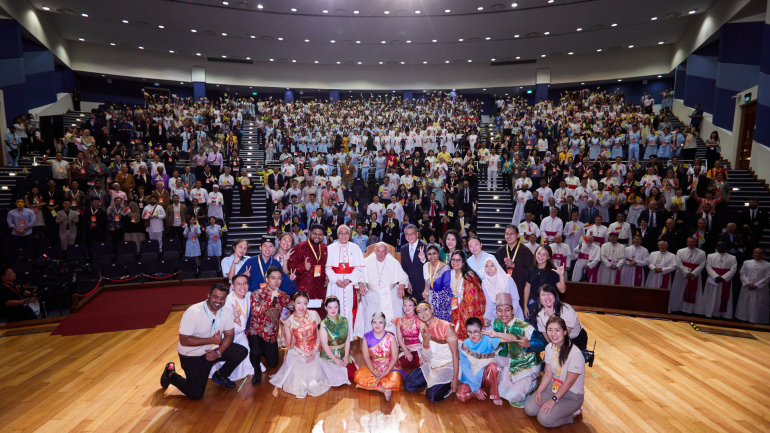Bridging faith and fear: Pope Francis inspires courage, dialogue in Singapore

Before concluding his Apostolic Journey, Pope Francis met with young people from different religious backgrounds at Catholic Junior College in Singapore on September 13.
During this meaningful interfaith gathering, Pope Francis engaged with the youth by answering three key questions, touching on criticism, the importance of stepping outside comfort zones, and the role of technology.
He also emphasized the vital role of interfaith dialogue and the pursuit of unity across different faiths.
On Leaving the Comfort Zone
Pope Francis urged the young people to embrace courage and move beyond their comfort zones, stressing that growth and construction require effort and a willingness to take risks.
He warned against becoming complacent, stating, “Young people who want to stay in their comfort zone all their life become fat.”
In a more symbolic message, he added, “Don’t make your stomach get fat, but your brain get fat.”
The Pope encouraged the youth not to shy away from taking risks, reminding them that fear can be stifling: “Fear is a dictatorial attitude.” He acknowledged that mistakes are inevitable, but they are essential for growth.
“It’s good to make mistakes, but recognize them when you do,” he said. The Pope posed a thought-provoking question: “What’s worse—making mistakes because you tried, or doing nothing at all to avoid mistakes?”
In a light-hearted yet profound manner, he concluded, “The young person who doesn’t take risks is already old.”
On Criticism
When asked about handling criticism, Pope Francis emphasized the importance of both giving and receiving feedback.
He urged the youth to be open to criticism, stating, “It’s essential not only to criticize others but to also accept criticism yourself.”
This, he explained, is key to sincere dialogue: “This is what genuine dialogue among young people looks like.”
On Technology
The Pope also addressed the role of technology in the lives of young people, warning against becoming enslaved to devices and social media.
“Use technology, media, and your phones in the right way, not to be a slave to them,” he advised, underscoring the need for balance and mindful usage of digital tools.
On Interfaith Dialogue
Regarding interreligious dialogue, Pope Francis encouraged the young people to engage in conversations about their faith, but with respect and humility.
“It’s important not to say, ‘My religion is more important than yours,’ or ‘My religion is true, but yours is not,’” he said.
Highlighting the importance of diversity in faith, the Holy Father remarked, “Every religion, even with different languages, is a way to reach God. God is God for all.”
He stressed that dialogue between different faiths requires both “courage” and “respect,” and that respectful dialogue is key to fostering understanding and peace.
Addressing Bullying
At one point, Pope Francis turned to the issue of bullying, asking the ten young people seated near him on stage for their thoughts.
Their answers ranged from “rejecting unhealed pain in someone” to “putting someone down without understanding them.”
The Pope agreed with their insights and added that physical bullying is especially oppressive, noting, “In schools, bullying often happens to those who are weaker, like disabled persons.”
He stressed the importance of recognizing everyone’s abilities and disabilities, adding, “Even the Pope has his own disabilities.” He concluded by underscoring the need for respect: “Respect is very important in dialogue.”
A Symbol of Unity
After his speech, Pope Francis joined the students in a symbolic act of painting together, a gesture that demonstrated their collective commitment to fostering cooperation and friendship across different beliefs.
This act highlighted the importance of nurturing harmony and coexistence among people of diverse faiths.
Radio Veritas Asia (RVA), a media platform of the Catholic Church, aims to share Christ. RVA started in 1969 as a continental Catholic radio station to serve Asian countries in their respective local language, thus earning the tag “the Voice of Asian Christianity.” Responding to the emerging context, RVA embraced media platforms to connect with the global Asian audience via its 21 language websites and various social media platforms.














